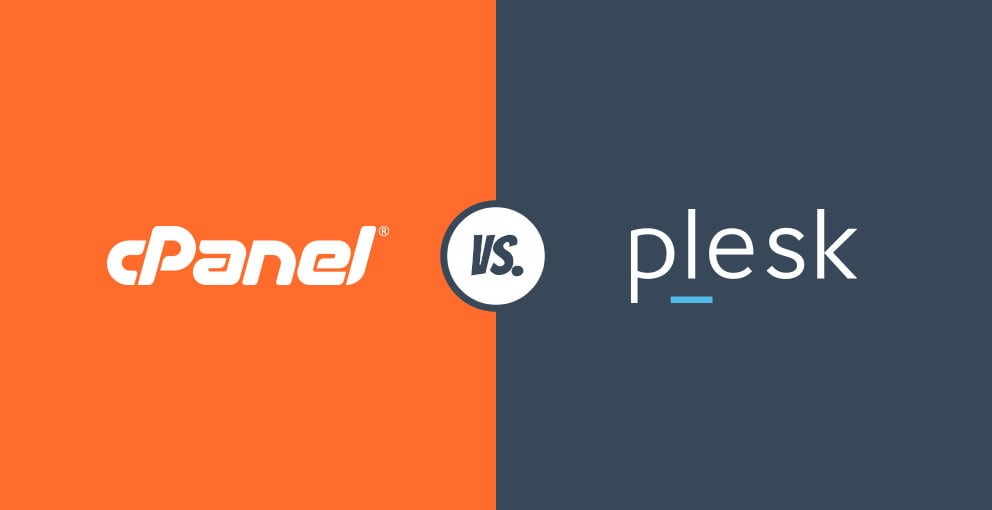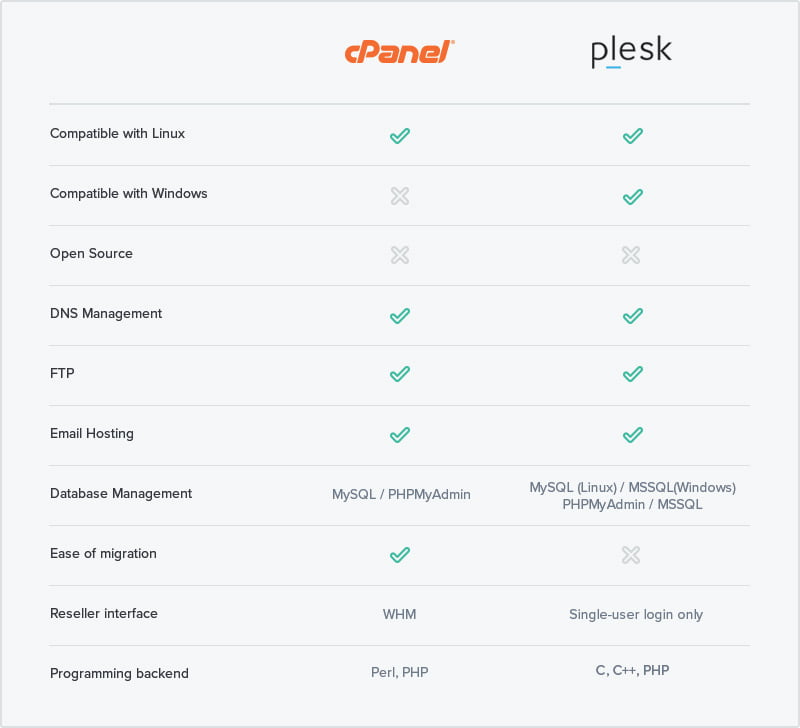
Last updated: April 2019
Making the difficult decision on where to host your website is one thing, but it is also important to take into account the platform you’ll be using, as, after all, it provides you with the tools necessary to build and maintain your website.
Here is a quick comparison of the world’s most popular hosting platforms, cPanel and Plesk.
At a glance
To receive the most out of your hosting service, you’ll want a web hosting interface that is not only user-friendly and straightforward to navigate, but you’ll also want to ensure that it provides you with a range of different applications such as SSH access, FTP management, and one-click installations of popular CMS’ (content management systems) such as WordPress and Magento. Ultimately, cPanel and Plesk both achieve the same goal of providing a suitable website management interface, however, with a completely unique and different experience.
There are vastly different features between the two platforms, which are discussed in this article.
Note: This article compares the two web hosting platforms as a whole, we are not comparing any particular cPanel or Plesk version.
Overview
cPanel is arguably the most prevalent web control panel in the world, with the majority of web hosting providers using it today. Our web hosting services also run off cPanel, which is a Linux-based platform.
Plesk reigns in at a close second and takes up a large majority – roughly 75-80%, of the European market. Plesk can be run in a Linux and Windows environment but has compatibility issues depending on what code is executed from your website.
Interface and its intuitiveness
When taking into account a suitable hosting interface for your website, it’s important to consider a variety of helpful tools that will enhance the overall management of your site. These features will include:
- Email management system
- FTP management system
- SSH access/management
- Database Management (MySQL/MSSQL)
- Backup Management System
- One-click CMS installer
cPanel and Plesk both offer these services, however, there are differentiating features between the two panels. Plesk doesn’t have the ability to access R1Soft Backups, as it is not an inherent feature of their control panel. All of our cPanel hosting services give you the ability to access R1Soft CDP.
Being the two largest hosting platforms in the world, Plesk and cPanel all offer these features in their respective control panel. Using the two platforms is entirely down to personal choice in terms of ease of navigation. cPanel and Plesk do the same thing, but they are twins always battling for their host’s attention.
You can always try Plesk’s free trial, or cPanel’s free trial to determine the most suitable platform for you.
Feel free to get all technical on me

The backend programming languages of both control panels vary the greatest and will impact your ability to easily migrate your service to another hosting provider in the future. cPanel is written almost entirely in Perl and PHP. It is inherently Linux based, and won’t operate or perform in a Windows environment.
Most hosting providers – including ourselves, run Linux servers, so moving your cPanel based service from one host to another should be a relatively easy and pain-free process.
Plesk is written entirely in C, C++ and PHP. If your website executes ASP or .NET code, it may be a difficult process to migrate your hosting to another provider in the future, as these websites primarily run off Windows-based servers.
This is also the case if you require an MSSQL database for your .NET framework, as this is only available on Windows Plesk.
At one point in time, cPanel did offer a version for Windows servers, which was called Enkompass. However, as of 2014, it has since been depreciated and cPanel no longer support it.
You will also want to strongly consider how you are going to develop your website, especially if you’re in the design process. This may affect your compatibility with Linux and Windows environments, so take precautionary measures when choosing your platform.
In saying this, Plesk is able to run in both Linux and Windows environments, which may make it slightly more appealable to those developers or resellers who require the ease of migration.
A quick google search may also provide some beneficial answers in which programming language to base your website on, however – for convenience’s sake – we won’t get into this debate. We’ll save that one for the Isaac Newton’s of programming.
Making the right choice
cPanel and Plesk are both excellent choices depending on individual circumstances, however, we hope that some of this information was valuable in aiding a decision.
Both panels perform the same functions, however, their differences are enough to provide you with a unique and vastly different experience.
You may meet the criteria for cPanel for interface intuitiveness, but may lack the technical specifications, making your choice more difficult.
It’s recommended to do also do your research before making an informed decision, and always remember, it could potentially be a difficult and tedious process to move between providers. Unfortunately, some may not be as compatible as others.
Whether you are utilising cPanel or Plesk, both can be migrated across to our services. If you have any questions about the platforms or the migration process, feel free to contact one of our 24/7 Australian based teams on 13 24 85.

